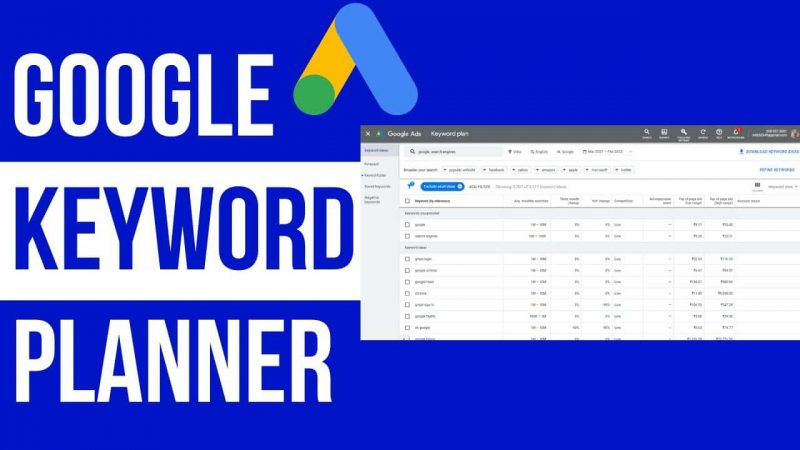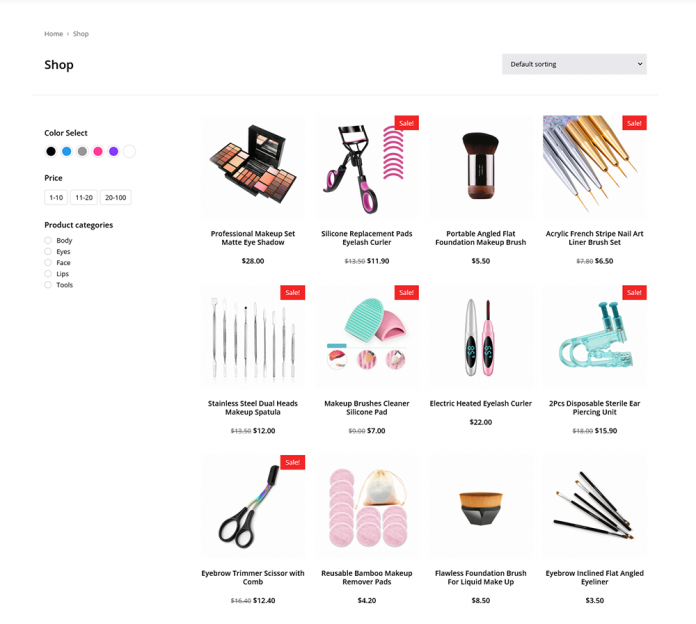The Google Keyword Planner can be tough to grasp at first. The Google AdWords Keyword Tool was previously known as the Keyword Planner. Our goal is to demonstrate how to use the Google Ads Keyword Planner. We want you to be able to sign up for an account and use their keyword research tool without any problems.
What exactly is Google Keyword Planner?
It is a useful, free service provided by Google Ads through your account. You can conduct thorough keyword research for Google Ads campaigns or search engine optimization. You can use the Keyword Planner to discover the search phrases that people enter into Google, as well as the search volume for your keywords, and to create Google Ads campaigns based on forecast data.
In Google Keyword Planner, you can view all search volume data
info on search volume keyword planner on Google To see search traffic data, you must have an active campaign when you register your Google Ads account. When it comes to search volume, you may notice data ranges. A keyword, for example, may have 720 Average Monthly Searches, but you can only see 100-1,000 Average Monthly Searches. To get all of the data in the Keyword Planner, create an active campaign.
Google Keyword Planner: How to Use It
- If you do not already have a Google Ads account, create one.
- Access your Google Ads account.
- At the top of your account, click the ‘Tools & Settings’ link. A wrench icon appears next to the link.
- Click on the ‘Keyword Planner’ link under the ‘Planning’ section.
- To begin using the Keyword Planner, click on ‘Discover new keywords.’
- You can choose ‘Start With Keywords’ or ‘Start With a Website’ when you discover new keywords.
- Create a campaign to gain access to all available data, including the keywords you’re targeting and search volume.
Find new keywords or obtain search volume and forecasts
You have two main choices. When you start the Keyword Planner, you have the option of searching for new keywords or getting search volume for existing ones. The planner can be used for keyword research as well as campaign predictions.
You can begin using the Google Keyword Planner by clicking on ‘Discover new keywords.’
Explore more: PPC and SEO, Nofollow vs. Dofollow, Site architecture, SEO Ranking Factors
Enter Search Terms to Find Related Search Terms
To begin, you can enter up to ten keywords and receive a plethora of related keyword ideas. You can also enter one keyword and locate the keywords that are most similar to it, which might be useful for creating Ad Groups. When you search for keywords, you will find millions of fresh keywords that can be used to expand your content keywords.
You can rank keywords based on average monthly searches, keyword relevance, competition, ad impression share, and top-of-page bid ranges.
Locations and languages should be updated
When utilizing the Keyword Planner, selecting locations and languages is a breeze. You will then only view search volume statistics for the areas and languages you have chosen.
You can change the places your company serves as well as the languages your consumers speak. For example, if you solely service the Kansas City area, you might make that your keyword plan’s location.
You can also select the languages your consumers speak. If your consumers only know French, for example, you can select that language as the language to target.
Keyword Planner Grouped Keywords
Sample Ad Groups can be found in the Google Keyword Planner by selecting the ‘Grouped Ideas’ tab. When you search for keywords, you’ll find groups of relevant keywords that you can utilize in your Google Ads campaigns by creating Ad Groups.
I recommend going over each keyword group of terms because you will come across unrelated ideas. I also use Grouped Ideas when writing articles.
Enter a Website to Search for Keywords Relevant to Any Website
You can either input a domain or a complete website. The Keyword Planner will return the most relevant keywords for your website if you use the full site. If you only use a single page, it will scrape the top keywords from that page.
What I’ve discovered is that when you enter your full website, the Keyword Planner returns more keywords, and the relevant keywords are generally keywords that your website ranks highly naturally in Google.
The keywords listed above are all keywords for which my website ranks. As a result, you may utilize the tool to determine which terms you are ranking for have the biggest search volume.
Make a keyword plan and an access plan
One of the most useful aspects of the Google Keyword Planner tool is the ability to construct a strategy, which is another way of saying a search campaign. With a plan, you may build Ad Groups, search terms, keyword match kinds, and, eventually, campaigns. You may also view forecast data for the following month by clicking the ‘Plan summary’ link.
When you add keywords, Ad Groups, and plans, you can save them and view them later. When you enter Keyword Planner, you will see the Plans you have generated and implemented.
5 Google Keyword Planner Techniques
We go over five different ways to help you get the most out of the Google Ads Keyword Tool. Even if the interface changes, the best practices, and recommendations given below will assist you in discovering profitable keywords.
Enter competitor URLs here
One of my favorite tactics is to take 5-10 different rival URLs and enter them individually into the Google Ads Keyword Planner to get new keywords that I would never consider. You’d be shocked at how many terms your competitors are ranking for, and I challenge you to outrank them.
Concentrate on Long-Tail Keywords
You’d be shocked at how many long-tail keywords you can rank for. Long-tail keywords with a tiny number of searches per month should not be avoided; you can simply rank for them and attract more traffic to your website.
Suggested Bids Demonstrate Value
When you find keywords with high suggested prices, top-of-page bids, and minimum bids, it usually shows the value that advertisers see in those terms. For example, if I target a term like “PPC Advertising Agency,” my campaign will most likely have a Cost-Per-Click (CPC) of more than $10.00. If I could rank for that keyword, it would be extremely useful because it would bring in more quality leads for my company.
Average Organic Position
You may now link your Google Search Console and Google Ads accounts to learn more about your typical organic ranking for a specific phrase. It might assist you in learning more about the keywords for which you are ranking and potential areas of opportunity.
Make use of forecasts and metrics
Google Ads Keyword Planner will provide you with projections and analytics for the terms you wish to target. It will not be exact for your campaign, but it will provide you with some ideas for bids, keywords to target, keywords to avoid, and other factors.
Frequently Asked Google Keyword Planner Questions
When you first start using Google Ads and the Keyword Planner, you may have some of the following queries.
How Do I Sign Up for a Google Keyword Planner Account?
To use the tool, you must have a Google account as well as a Google Ads account. You can begin by logging in to an existing Gmail account. Then, all you have to do is open Google Ads and sign up for an account. The keyword planner tool is accessible straight from the Tools & Settings menu. Inactive ad accounts have various limits, but you can still access all the information you need.
Is Google Keyword Planner completely free?
Yes, you may use the Google Keyword Planner tool for free; all you need is a Google Ads account. To use the planner, you do not need to have any money in your account. It is designed to help advertisers research keywords, construct keyword lists, and create successful campaigns. Because Google ultimately wants you to spend money with their advertising platform, the Keyword Planner is useful for advertisers.
How Do I Get Keywords From Keyword Planner?
You can quickly download keyword suggestions as you start searching for keywords and discovering fresh ideas. Simply click the ‘Download Keyword Ideas’ option in the top right corner of the screen. You will be able to get keyword ideas as an a.csv file or for Google Sheets.
Is the data from Google Keyword Planner reliable?
In my experience, the information on search volume suggested offers, and competition is fairly true. When I bid on keywords through Google Ads, the bids tend to match what I see as an advertiser. Close variants to each keyword are included in search volume statistics. As a result, the number in the keyword planner tool tends to be higher than the number of specific searches for that term.
What is Keyword Research?
We’ve included numerous keyword research video lessons below to show you how to conduct PPC Keyword Research and SEO Keyword Research for your business. You may find our whole YouTube playlist here.
Tutorial on Keyword Research
Watch the video below to learn the process I use to conduct keyword research for my websites and clients. Finding the greatest possible keywords for your organization is the first step in developing a Content Marketing strategy. Finding keywords and developing content for those keywords is the primary way I increase organic search traffic. My whole keyword research guide may be found here.
Keyword Research for Pay-Per-Click Advertising
Google Ads and Bing Microsoft Advertising are the two PPC Advertising Networks for which you should use the Keyword Tool for research. Because popular search phrases on both channels are extremely similar, the Google Keyword Planner may provide you with amazing ideas for both networks. Our PPC keyword research tutorial may be found here.
You may utilize the Keyword Planner for Pinterest Ads in addition to Google Ads and Microsoft Ads campaigns. You can use your keyword research lists in Pinterest Advertising Campaigns because keyword targeting is a common function.
Tutorial on Keyword Research for Search Engine Optimization
Keyword research for Search Engine Optimization is quite challenging for novices. To find your top keywords, you must employ a range of keyword tools, search engines, shopping engines, and other resources. Furthermore, tools like Google Trends might be useful for locating keywords as they trend.
Tutorial on YouTube Keyword Research
If you have a YouTube channel, researching keywords and difficulties that others are experiencing can be a terrific opportunity. Because YouTube is the second largest search engine, it is critical to focus on YouTube keywords as well in order to expand your channel. The strategy I use to uncover profitable YouTube keywords that will drive views and subscribers is detailed below.
You May also like sitescorechecker, Pro Site Ranker








